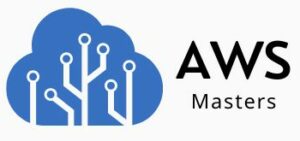AWS training in hyderabad
with
100% Placements & Internships
- Comprehensive Curriculum
- Expert Trainers
- Real-Time Projects
- Certification
Table of Contents
ToggleAWS Course In Hyderabad
Batch Details
| Trainer Name | Mr. Dinesh |
| Trainer Experience | 10+Years |
| Timings | Monday to Friday (Morning and evening) |
| Next Batch Date | 25-AUG-2025 AT 11:00 AM |
| Training Modes | Classroom & Online |
| Call us at | +91 9000360654 |
| Email us at | awsmasters.in@gmail.com |
| For More Details at | For More Demo Details |
AWS Course Institute In Hyderabad
Why choose us?
- Industry-Experienced Trainers
- AWS-Certified Faculty
- Real-Time Projects & Labs
- Updated Curriculum Aligned with Certifications
- 100% Placement Assistance
- Flexible Batch Timings (Weekday/Weekend)
- Resume & Interview Preparation
- Live AWS Account Practice
- Mock Tests & Certification Guidance
- Small Batch Size for Personal Attention
- Lifetime LMS Access
- Tie-ups with Top Hiring Companies
AWS Course In Hyderabad
Amazon web Services Curriculum
Module 1 - Introduction to Cloud Computing and AWS
- What is Cloud Computing?
- Types of Cloud (Public, Private, Hybrid)
- Service Models: IaaS, PaaS, SaaS
- Benefits of Cloud Computing
- Major Cloud Providers: AWS vs Azure vs GCP
- AWS Global Infrastructure
- Regions, Availability Zones
- Edge Locations
- Data Centers
Module 2 - AWS Account Setup & Free Tier
- Creating AWS Free Tier Account
- Understanding AWS Billing and Pricing
- AWS Budgets and Cost Calculator
- IAM Best Practices for New Accounts
- Hands-on: Billing alerts setup
Module 3 - Identity and Access Management (IAM)
- What is IAM?
- Users, Groups, Roles, and Policies
- IAM Policy Structure (JSON)
- MFA (Multi-Factor Authentication)
- AWS Organizations (Basic Overview)
- Hands-on: Creating IAM users with permission boundaries
Module 4 - Amazon EC2 (Elastic Compute Cloud)
- Introduction to EC2
- Instance Types & Pricing Models
- Launching EC2 Instances (Linux & Windows)
- SSH Key Pairs and Security Groups
- Elastic IPs
- AMIs and Snapshots
- Hands-on: Web server setup using EC2
Module 5 - Amazon S3 (Simple Storage Service)
- S3 Overview and Use Cases
- S3 Buckets, Objects, Storage Classes
- Versioning, Lifecycle Rules
- Static Website Hosting
- Pre-signed URLs
- S3 Security (Bucket Policy, ACLs)
- Hands-on: Hosting a static website
Module 6 - Elastic Load Balancing (ELB) and Auto Scaling
- Types of Load Balancers
- Application Load Balancer
- Network Load Balancer
- Auto Scaling Concepts
- Launch Configurations & Scaling Policies
- Hands-on: Auto Scaling group setup
Module 7 - Amazon VPC (Virtual Private Cloud)
- VPC Basics
- Subnets, Route Tables, Internet Gateway
- NAT Gateway vs NAT Instance
- Security Groups vs NACLs
- Peering and VPC Endpoints
- Hands-on: Create custom VPC with public and private subnets
Module 8 - AWS Databases
A. RDS (Relational Database Service)
- RDS Overview
- Supported DB Engines (MySQL, PostgreSQL, etc.)
- Backups, Snapshots, Multi-AZ & Read Replicas
B. DynamoDB
- NoSQL Basics
- Tables, Items, Attributes
- Partition Key & Sort Key
- On-Demand vs Provisioned
C. Aurora
- Aurora MySQL vs PostgreSQL
- Serverless Aurora
Module 9 - Route 53 – DNS and Domain Management
- Domain Registration
- Hosted Zones
- Record Types (A, AAAA, CNAME, etc.)
- Routing Policies (Failover, Weighted, Latency)
- Hands-on: Connect domain with EC2/S3
Module 10 - AWS Lambda (Serverless Computing)
- What is Serverless?
- Lambda Concepts
- Creating and Deploying Functions
- Event Triggers (S3, DynamoDB, API Gateway)
- Lambda + IAM Roles
- Hands-on: Trigger Lambda using S3 upload
Module 11 - CloudWatch, CloudTrail & Monitoring
- AWS CloudWatch: Metrics, Alarms, Logs
- Creating Custom Metrics
- AWS CloudTrail: User Activity Logs
- Hands-on: Set up monitoring for EC2 and S3
Module 12 - AWS SNS, SQS, and EventBridge
- Amazon SNS (Push Notifications)
- Amazon SQS (Message Queues)
- Dead-letter Queues
- EventBridge vs CloudWatch Events
- Use Cases in Real Applications
Module 13 - AWS API Gateway
- REST APIs vs HTTP APIs
- Integration with Lambda
- Security (API Keys, Usage Plans, Throttling)
- Deployment Stages
- Hands-on: Create Serverless API with API Gateway + Lambda
Module 14: AWS CloudFormation
- Infrastructure as Code (IaC) Basics
- Template Format (YAML/JSON)
- Stack Creation and Management
- Nested Stacks and Change Sets
Module 15 - AWS Elastic Beanstalk
- PaaS Overview
- Deploying Web Applications
- Configuration & Scaling
Monitoring and Rollback
Module 16 - AWS EFS and FSx
- EFS vs S3 vs Instance Store
- Mount Targets and Security
- AWS FSx (Windows File System)
Module 17 - AWS Security Tools
- AWS WAF (Web Application Firewall)
- AWS Shield (DDoS Protection)
- AWS Config and GuardDuty
Inspector and Security Hub
Module 18 - AWS DevOps Tools
- AWS CodeCommit, CodeBuild, CodePipeline
- CI/CD Concepts
- Deploying with CodeDeploy
- GitHub Actions Integration
Module 19 - Migration and Hybrid Cloud
- AWS Migration Hub
- Server Migration Service (SMS)
- Database Migration Service (DMS)
Snowball & Storage Gateway
Module 20 - AWS Certification Exam Preparation
- AWS Certified Solutions Architect – Associate/Professional
- Practice Questions & Mock Exams
- Whitepapers & Case Studies
- Exam Registration Process
- Interview Preparation
Module 21 - AWS CLI and SDKs (Command Line Interface & Software Development Kits)
- Installing AWS CLI on Windows/Linux/Mac
- Configuring AWS CLI Profiles
- Common CLI Commands (EC2, S3, IAM)
- AWS SDKs Overview (Python – Boto3, JavaScript, Java)
- Hands-on: Automating S3/EC2 with AWS CLI
Module 22 - Amazon CloudFront (Content Delivery Network)
- What is CDN?
- CloudFront Distribution Types
- Integrating with S3 and EC2
- Caching and TTL
- Signed URLs & Cookies
- Hands-on: Deliver static site using CloudFront
Module 23 - AWS Systems Manager (SSM)
- Patch Manager
- Session Manager for EC2 Access (No SSH)
- Parameter Store vs Secrets Manager
- Automation Documents
- Hands-on: Running shell commands on EC2 using SSM
Module 24 - AWS Secrets Manager
- Secrets vs Parameters
- Rotation of Secrets
- IAM Policies for Access
- Hands-on: Store and retrieve DB credentials securely
Module 25 - AWS Global Accelerator
- Global traffic management overview
- Static IP addresses for applications
- Latency-based routing
- Difference between Route 53 and Global Accelerator
Module 26 - AWS Backup & Disaster Recovery
- Backup Plans & Vaults
- Cross-region backups
- Disaster Recovery (RTO vs RPO)
- Automated backup policies for EC2, EBS, RDS
Module 27 - AWS Certificate Manager (ACM)
- SSL/TLS Certificates Management
- Public and Private Certificates
- Integration with ELB and CloudFront
- Hands-on: SSL on EC2 via ACM
Module 28 - AWS Direct Connect & Site-to-Site VPN
- On-premise to AWS secure connectivity
- MPLS vs VPN vs Direct Connect
- Hybrid cloud architecture
- Routing, BGP Configuration (Basic Level)
Module 29 - AWS Organizations and Consolidated Billing
- Multi-account management
- Organizational Units (OUs)
- SCPs (Service Control Policies)
- Cross-account IAM
Module 30 - AWS Cost Management & Cost Explorer
- AWS Budgets & Alerts
- Cost Categories & Reports
- Reserved vs On-demand cost analysis
- Hands-on: Analyzing EC2 & S3 usage
Module 31 - Amazon Elastic File System (EFS) Advanced
- Performance Modes (General Purpose, Max I/O)
- Throughput Modes (Bursting vs Provisioned)
- Backup & Restore for EFS
- EFS Access Points
Module 32 - Amazon FSx (For Windows & Lustre)
- Windows File System setup
- Lustre for HPC/Big Data
- Integrate with S3
- FSx Backup and Restore
Module 33 - AWS Outposts
- On-premise AWS services
- Hybrid workloads
- Real-world Use Cases
- Limitations and regions
Module 34 - AWS Step Functions
- Serverless Workflows
- Integrate with Lambda, DynamoDB, SQS
- JSON-based State Machine
- Error handling and retries
Module 35 - Amazon Kinesis (Real-Time Data Streaming)
- Kinesis Data Streams, Firehose, Analytics
- Real-time log analysis and ingestion
- Hands-on: Stream data from EC2 logs to S3
Module 36 - Amazon EMR (Elastic MapReduce)
- Hadoop and Spark on AWS
- Big Data Processing Cluster Setup
- Integration with S3 and Redshift
Module 37 - Amazon Redshift (Data Warehouse)
- Columnar Storage and Compression
- Redshift Spectrum
- Connecting with BI Tools
- Redshift vs RDS vs Aurora
Module 38 - Amazon QuickSight (Business Intelligence)
- Creating dashboards and visuals
- Data sources (S3, RDS, Redshift)
- SPICE engine
- User management and access control
Module 39 - AWS Glue (Data Cataloging and ETL)
- Crawlers and Catalog
- Glue Jobs (Spark & Python Shell)
- Data Lake integration with Athena
Hands-on: ETL pipeline using Glue
Module 40 - Amazon Athena (Serverless SQL)
- Querying data in S3 using SQL
- Integration with Glue Data Catalog
- Cost optimization tips
- Hands-on: Analyze logs in S3
Module 41 - AWS Lake Formation
- Building secure Data Lakes
- Lake Formation vs Glue
- Data Access Control
- Hands-on: Set up a secure data lake
Module 42 - AWS CodeStar
- Rapid DevOps Setup
- Integration with GitHub & CodePipeline
- Role-based access for teams
- Project templates
Module 43 - AWS Cloud9 (Cloud IDE)
- Online IDE setup
- Writing Lambda and Python scripts
- Real-time collaboration
- CLI access to AWS resources
Module 44 - AWS AppConfig (Feature Flags Management)
- Deploy feature flags with safety
- Integration with Lambda and EC2
- Monitoring config changes
Module 45 - AWS Service Catalog
- Centralized application management
- Creating product portfolios
- Governance using tagging
Module 46 - AWS Control Tower
- Centralized application management
- Creating product portfolios
- Governance using tagging
AWS Trainer Details
INSTRUCTOR
Mr. Dinesh
Expert & Lead Instructor
10+ Years Experience
About the tutor:
Mr. Dinesh, our AWS Trainer, brings over 10+ years of industry experience in cloud computing and IT infrastructure. With deep expertise in Amazon Web Services (AWS), Mr. Dinesh has worked with top MNCs and fast-growing startups, delivering cloud solutions across various domains like finance, healthcare, and e-commerce.
He specializes in teaching core AWS services such as EC2, S3, Lambda, RDS, VPC, CloudFormation, and IAM, along with real-time implementation of DevOps practices using tools like Docker, Jenkins, and Terraform. His training approach focus attention on hands-on labs, live projects, and real-world scenarios, making learning highly practical and job-focused.
Beyond technical training, Mr. Dinesh also mentors students in resume building, certification preparation (AWS Certified Solutions Architect, Developer, SysOps), mock interviews, and career guidance, ensuring learners are fully provide to enter and succeed in the cloud industry.
Why Join Our AWS Institute In Hyderabad
Key Points
- Expert AWS Training
Our training is delivered by certified AWS professionals with real-world industry exposure. They not only teach the syllabus but also share practical insights, use cases, and best practices that help you stand out in interviews and on the job.
- Live Project Training
Students work on actual cloud environments, configuring servers, storage, security, and automation tools like EC2, S3, Lambda, and CloudFormation. This hands-on approach builds deep confidence in handling real AWS tasks.
- Cert Exam Support
We provide structured preparation for globally recognized AWS certifications like Cloud Practitioner, Solutions Architect, and DevOps Engineer. Mock tests, case studies, and exam-specific mentoring ensure you pass with high scores.
- 100% Placement Help
Our institute has tie-ups with recruiters and companies in Hyderabad’s tech ecosystem. You’ll receive resume reviews, interview prep, and direct job referrals—especially for freshers and those transitioning into cloud roles.
- Beginner to Pro Levels
Whether you’re a beginner, IT student, or working professional, our curriculum adapts to your needs. You’ll go from understanding cloud basics to mastering architecture, networking, DevOps integration, and security on AWS.
- 24/7 Lab Access
Practice what you learn anytime with dedicated access to virtual AWS labs. You can simulate real-time deployment scenarios and get instant feedback on configurations and commands.
- Prime Hyderabad Location
We’re based in major IT corridors like Ameerpet or Hitec City, allowing easy access for professionals and students. Plus, you’re surrounded by cloud meetups, tech events, and real career opportunities.
- Personal Mentorship
Weekly doubt-clearing sessions, live Q&A with trainers, and personal mentoring ensure you never feel stuck. Our team supports your learning journey at every step.
- Internship Opportunities
Gain access to internships and real-time client projects that enhance your profile. These internships provide project experience you can showcase on your resume and LinkedIn.
What is Amazon Web Services ?
- AWS is a cloud computing platform offered by Amazon that provides on-demand IT services and resources. These include computing power, storage, databases, networking, and more. It enables businesses to scale and innovate faster without physical infrastructure.
- AWS follows a pay-as-you-go model, meaning users only pay for what they use. This eliminates upfront hardware costs and allows flexible scaling. It’s ideal for startups, enterprises, and individuals alike.
- AWS has a global network of data centers called Availability Zones and Regions. This widespread infrastructure ensures high availability, low latency, and fault tolerance. It supports users worldwide with reliable and secure access to services.
- AWS offers advanced security features such as encryption, access control, and compliance certifications. It follows global standards like ISO, HIPAA, and GDPR, helping businesses meet regulatory requirements.
- AWS provides over 200 fully featured services including EC2 (compute), S3 (storage), RDS (databases), Lambda (serverless), and more. These services cover application hosting, machine learning, analytics, IoT, and DevOps.
- AWS is used by millions of organizations including Netflix, NASA, Airbnb, and government agencies. Common use cases include web hosting, data backup, disaster recovery, machine learning, and content delivery.
Objectives of the AWS Training In Hyderabad
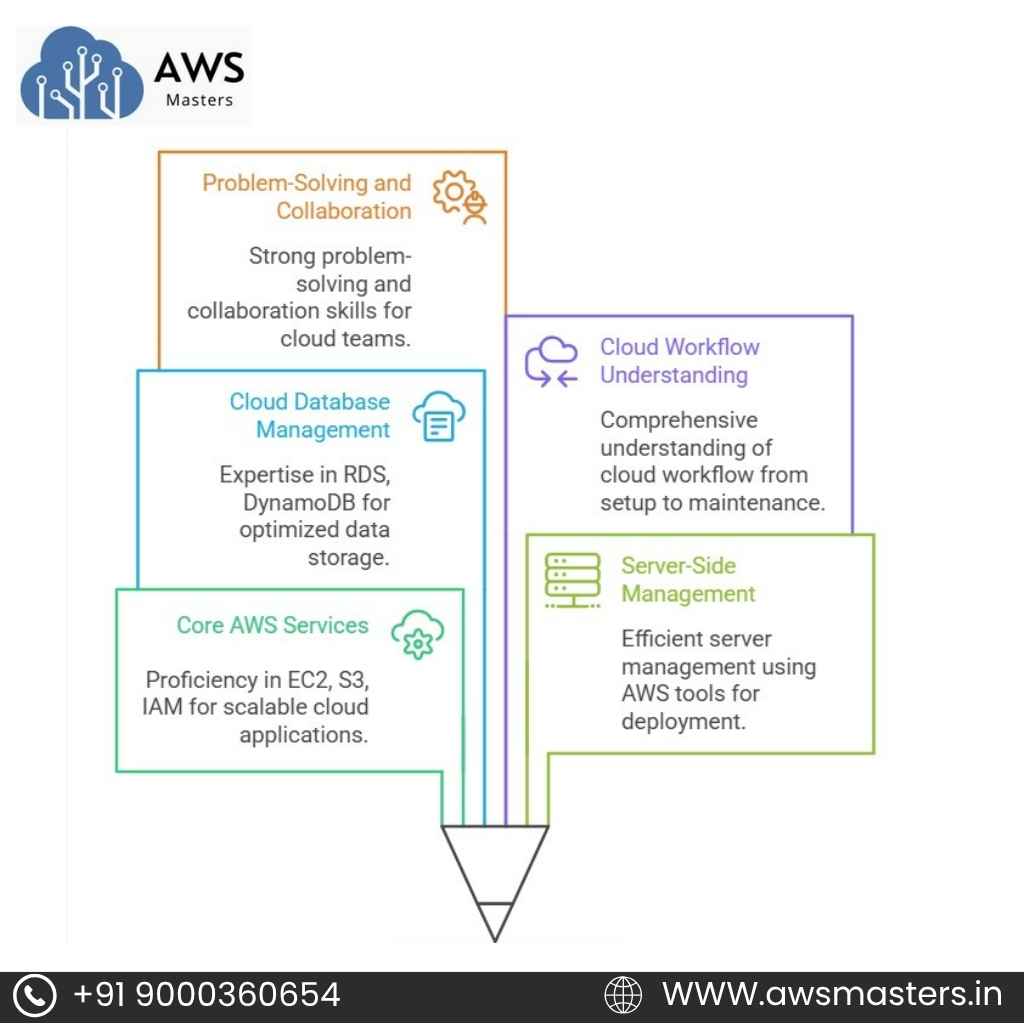
- Gain expertise in core AWS services like EC2, S3, and IAM to build and manage scalable and secure cloud-based applications.
- Develop skills in server-side management using AWS tools to deploy, monitor, and scale applications efficiently.
- Learn how to configure and manage cloud databases like Amazon RDS and DynamoDB for optimized data storage and retrieval.
- Understand the complete cloud workflow—from infrastructure setup to automation, deployment, and maintenance of AWS solutions.
- Build strong problem-solving skills and real-time project collaboration techniques to work effectively in cloud-based team environments.
Prerequisites of AWS
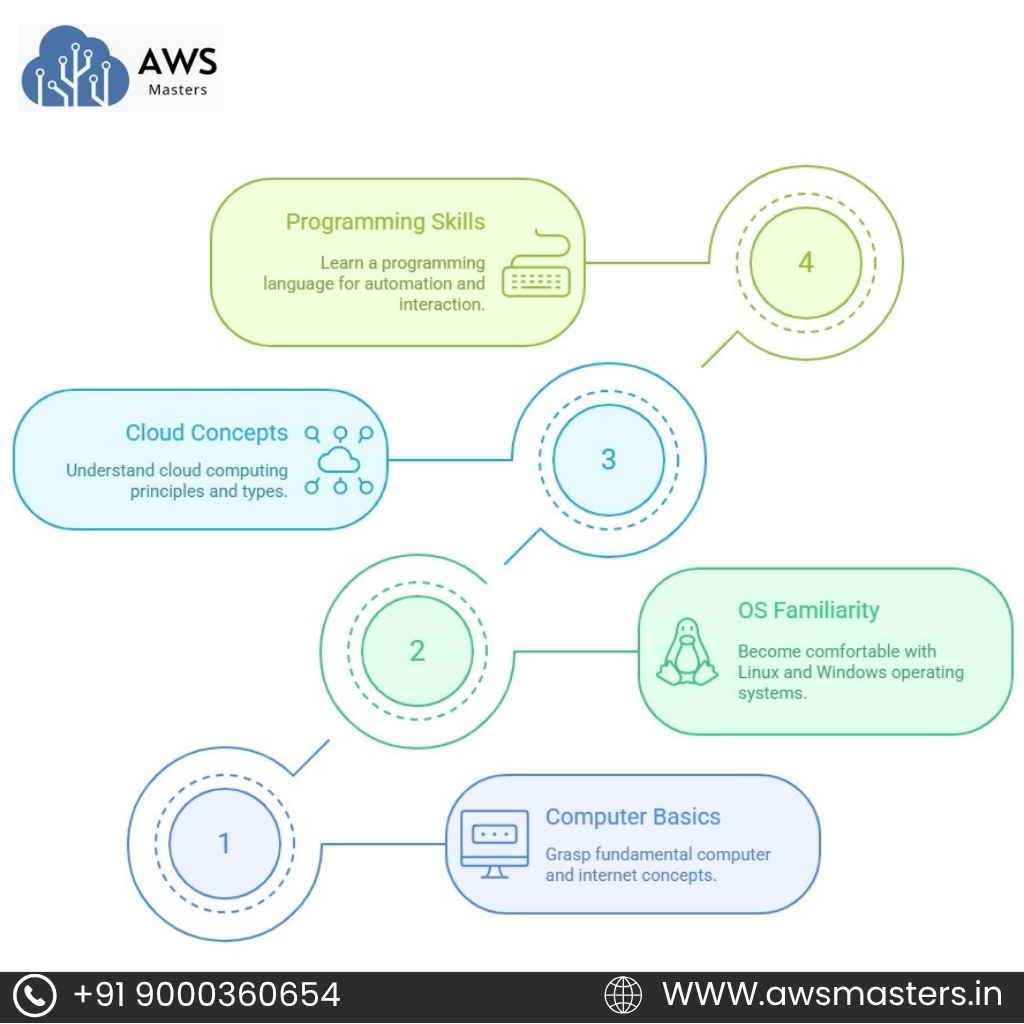
- Understanding how computers, servers, and the internet work (IP address, DNS, HTTP, etc.) will help you grasp AWS services better.
- Familiarity with Linux (basic commands, file systems) and Windows OS is useful, as AWS provides virtual machines (EC2) running both.
- Know the basics of cloud computing concepts like virtualization, scalability, elasticity, and types of cloud (IaaS, PaaS, SaaS).
- Knowing at least one language (Python, JavaScript, or Shell scripting) helps in automation, Lambda functions, and interacting with AWS services through SDKs or CLI.
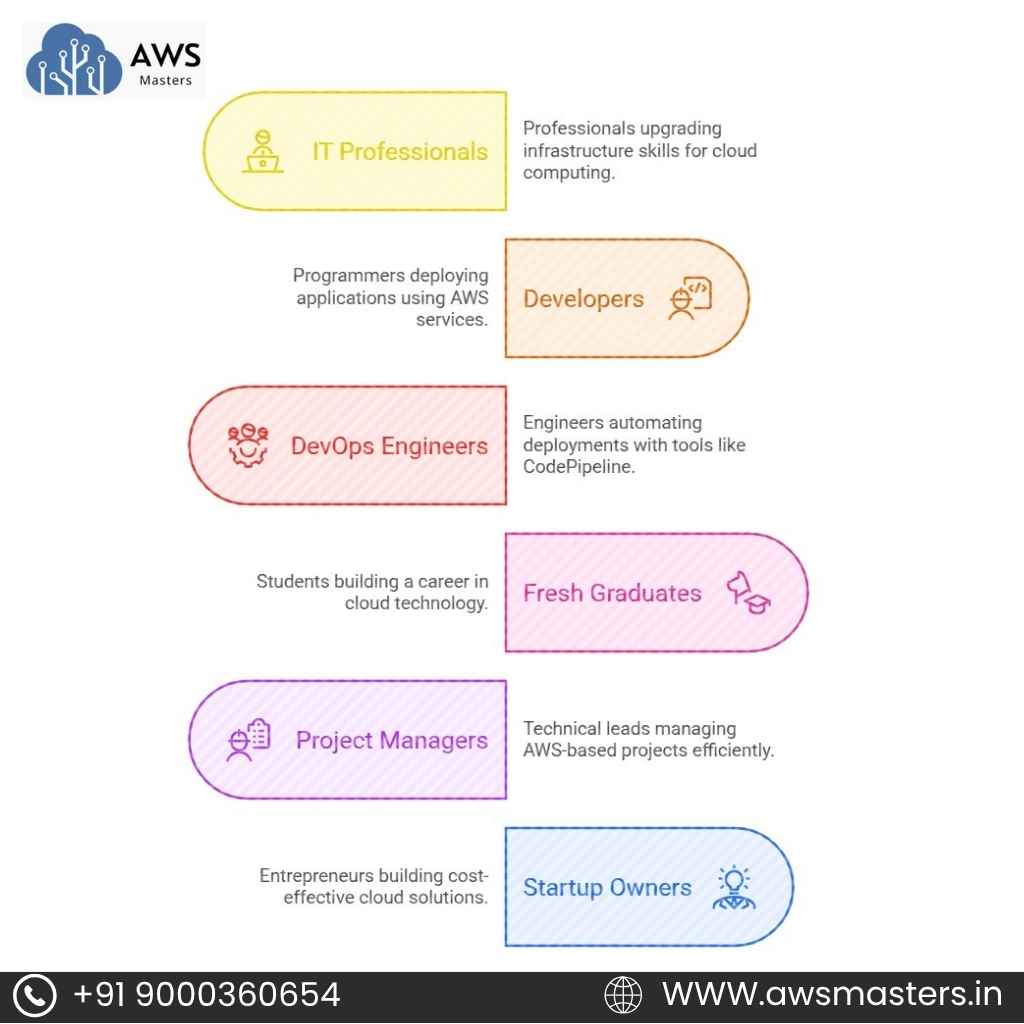
Who should learn AWS course
- IT professionals looking to shift into cloud computing or upgrade their existing infrastructure skills.
- Developers and programmers who want to deploy, scale, and manage applications using AWS services.
- DevOps engineers aiming to automate deployments and manage cloud environments with tools like CodePipeline and CloudFormation.
- Fresh graduates and students seeking to build a career in cloud technology with globally recognized certifications.
- Project managers and technical leads who need cloud knowledge to manage AWS-based projects efficiently.
- Entrepreneurs and startup owners interested in building cost-effective, scalable cloud solutions.
AWS Training in Hyderabad
Course Outline
This AWS Training in Hyderabad provides a concise yet comprehensive overview of Amazon Web Services, aimed at beginners and professionals looking to build or enhance their cloud skills.
Covers cloud models (IaaS, PaaS, SaaS), AWS global infrastructure, and how to set up and navigate the AWS Management Console.
Learn to launch, configure, and manage virtual servers using EC2, with topics like security groups, key pairs, and Auto Scaling.
Understand how to store and manage data using Amazon S3, EBS for volumes and snapshots, and Glacier for backups.
Covers setting up virtual networks, subnets, gateways, and using Route 53 for DNS and CloudFront for content delivery.
Manage users, roles, and permissions with IAM, along with implementing security best practices and MFA.
Learn to deploy and manage relational and NoSQL databases using Amazon RDS and DynamoDB.
Covers CloudWatch, CloudTrail, and automation tools like CodePipeline, Lambda, and CloudFormation for DevOps integration.
Aws Course In Hyderabad
Modes
Classroom Training
- Daily Recorded Videos
- One - One Project Guidence
- Practical Application
- Get support till you are placed
- Mock Interviews
- Well-Organized Syllabus
Online Training
- Flexible Learning Schedule
- Recorded Video access
- Whatsapp Group Access
- Doubt Clearing Sessions
- Daily Session Recordings
- Real-world Projects
Corporate Training
- Live Project Training
- On-site or Virtual Training Sessions
- Doubt Clearing Sessions
- Daily Class Recordings
- Team-building Activities
- Video Material Access
Aws Training In Hyderabad
Career Opportunities
01
Cloud Engineer
After AWS training, you can work as a Cloud Engineer, managing cloud infrastructure, automation, and deployments for businesses of all sizes.
02
AWS Solutions Architect
This role involves designing scalable and secure AWS-based solutions, making it ideal for those skilled in cloud architecture and best practices.
03
DevOps Engineer
With AWS DevOps tools, you can become a DevOps Engineer, automating CI/CD pipelines and infrastructure using services like CodeDeploy and CloudFormation.
04
Cloud System Administrator
You can take on roles as a Cloud SysAdmin, handling server maintenance, networking, and user access across cloud environments.
05
Data Engineer or Analyst
AWS skills open doors to data roles using tools like Redshift, Glue, and Athena for data processing, storage, and analysis.
06
Freelancer or Cloud Consultant
Certified AWS professionals can work independently as freelancers or consultants, helping businesses migrate and manage cloud solutions.
AWS Training Institute In Hyderabad
Skills Developed
Cloud Infrastructure Management
You will learn to design, deploy, and manage scalable cloud infrastructure using core AWS services like EC2, S3, and VPC. This includes understanding global AWS architecture and ensuring high availability and fault tolerance.
Security and Identity Management
The training provide you with skills in AWS Identity and Access Management (IAM), encryption, and compliance. You’ll learn to control user access, implement multi-factor authentication, and apply security best practices.
Serverless Computing and Automation
Gain hands-on experience with AWS Lambda, API Gateway, and automation tools like Cloud Formation. You’ll develop the ability to build and manage serverless applications and automate cloud resource provisioning.
Database and Storage Management
You’ll work with AWS database services like RDS, DynamoDB, and Redshift, learning how to store, retrieve, and manage data effectively. Skills in backup, replication, and performance tuning are also developed.
Monitoring and Troubleshooting
Learn to use tools like CloudWatch, CloudTrail, and AWS Config to monitor application health, set up alerts, and troubleshoot performance issues in real time.
Real-Time Project Execution
The course involves executing real-world projects that mirror business environments, helping you gain confidence in deploying, managing, and optimizing AWS-based solutions.
AWS Course Online
Certifications
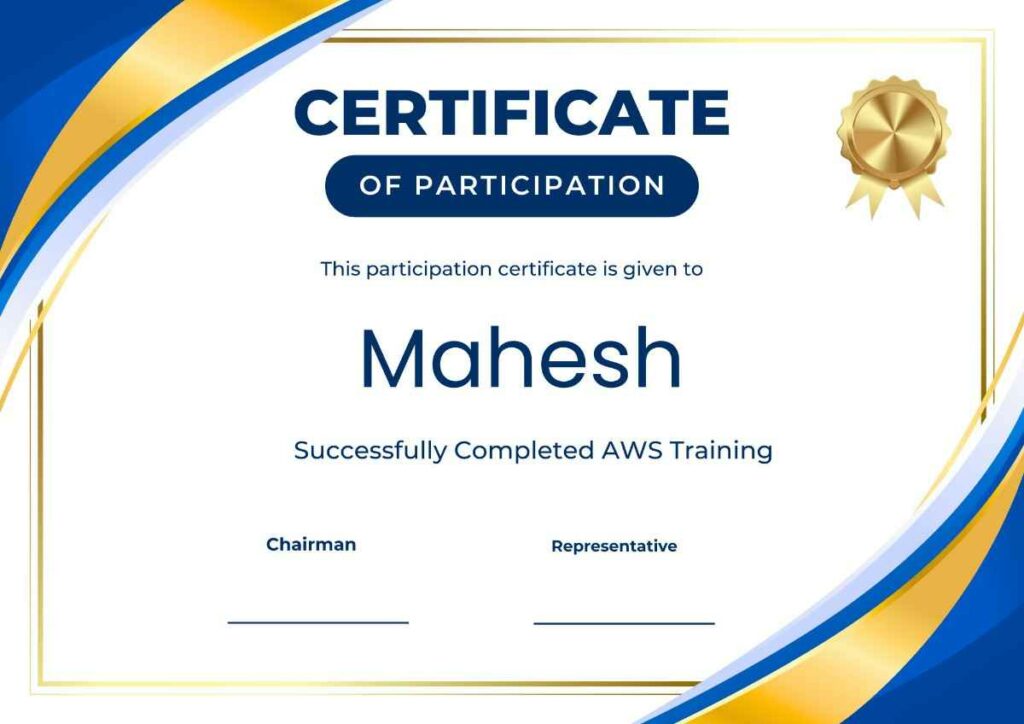
- The importance of AWS Certification is highly beneficial for those aiming to lead in the cloud and IT industry.
- It enhances the skills and career paths of cloud engineers, developers, and system administrators.
- Our AWS certification helps you stand out in today’s competitive job market.
- Employers prioritise certified professionals for their proven expertise and commitment to continuous learning.
- AWS Certification validates your knowledge of essential cloud tools, services, and best practices.
Companies that Hire From Amazon Masters












Amazon web services Course In Hyderabad
Benefits
- Industry-Relevant Skills
AWS Training in Hyderabad equips you with hands-on experience in cloud services like EC2, S3, RDS, and Lambda. These skills are in high demand across industries and prepare you for real-world job roles.
- Certification Preparation
The training includes complete guidance for AWS certifications such as Solutions Architect, Developer Associate, and SysOps. It boosts your chances of passing on the first attempt with mock tests and expert tips.
- High-Paying Job Opportunities
AWS-certified professionals are among the highest paid in the IT sector. Completing this training opens doors to roles like Cloud Engineer, DevOps Engineer, and AWS Solutions Architect.
- Flexible Learning Options
Training institutes in Hyderabad offer flexible batches, online/offline classes, and weekend options. This makes it easier for working professionals and students to balance learning with other responsibilities.
- Real-Time Project Experience
You’ll work on real-time projects that simulate live business environments. These hands-on exercises help you build confidence and apply your knowledge practically.
- Placement and Career Support
Most AWS training institutes in Hyderabad provide resume building, interview prep, and placement assistance. This ensures you’re job-ready and supported even after the course ends.
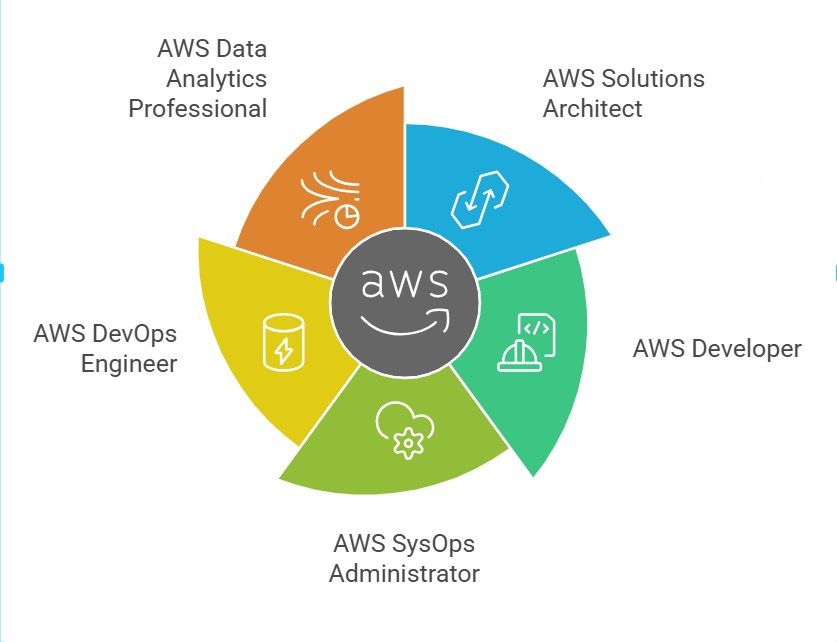
Amazon Web Services Course
Placement Opportunities
- AWS Solutions Architect
- AWS Developer
- AWS SysOps Administrator
- AWS DevOps Engineer
- AWS Data Analytics
Amazon Web Services Course
Market Trend
Growing Cloud Adoption
The demand for cloud computing is rapidly increasing as businesses shift from traditional infrastructure to cloud-based solutions. AWS leads the market, making its training highly valuable across industries.
High Market Share
AWS holds the largest share in the global cloud services market, outpacing competitors like Microsoft Azure and Google Cloud. This dominance creates a strong job market for AWS-certified professionals.
Increased Job Demand
There’s a rising demand for cloud professionals with AWS expertise, including roles like Cloud Architect, DevOps Engineer, and Cloud Administrator. Companies are actively hiring certified candidates to support cloud migration.
Lucrative Salary Packages
AWS-certified professionals command high salaries due to the specialized skill set and certification credibility. As more companies rely on AWS, salary expectations continue to rise globally.
Startups and Enterprises Rely on AWS
Both startups and large enterprises prefer AWS for its flexibility, scalability, and cost-efficiency. This broad adoption ensures steady opportunities across various business sizes.
Support for Emerging Technologies
AWS supports AI, machine learning, big data, and IoT development, making its courses future-proof. Professionals trained in AWS stay relevant in an evolving tech landscape.
Global Certification Recognition
AWS certifications are globally recognized and respected by employers across sectors. This enables professionals to access job opportunities not just locally but worldwide.
Learning Platforms Grow
Due to high demand, many training institutes and e-learning platforms are offering specialized AWS courses. This trend ensures easy access to quality education and certification preparation.
Frequently Asked questions about AWS Tranining
FAQs
What is the best AWS training institute in Hyderabad?
There are several top-rated institutes in Hyderabad like Kelly Technologies, Besant Technologies, Aws Masters, and Naresh i Technologies. Look for institutes offering certified trainers, real-time projects, and job support.
Which AWS course is most popular in Hyderabad?
The AWS Certified Solutions Architect – Associate course is the most popular in Hyderabad as it suits both beginners and working professionals aiming to enter cloud computing.
How much does AWS training cost in Hyderabad?
AWS training in Hyderabad typically costs between ₹15,000 to ₹35,000 depending on the course level (Foundational to Advanced) and institute. Online classes may have flexible pricing.
Is AWS certification training available in Ameerpet, Hyderabad?
Yes, Ameerpet is a well-known training hub where many institutes offer comprehensive AWS certification programs with flexible timings and affordable fees.
Can I get job placement after AWS training in Hyderabad?
Many AWS institutes in Hyderabad offer placement assistance, resume building, and mock interviews. However, securing a job depends on your skills and certification level.
Which is better – online or classroom AWS training in Hyderabad?
Both have their benefits. Classroom training offers direct interaction, while online classes offer flexibility. Choose based on your schedule and learning preference.
What is the duration of the AWS course in Hyderabad?
The typical duration is 1 to 2 months for weekday batches and 2 to 3 months for weekend batches, depending on the course level and schedule.
Are there any weekend AWS training batches in Hyderabad?
Yes, most institutes in Hyderabad offer weekend batches for working professionals who cannot attend weekday classes.
Do AWS training institutes in Hyderabad offer certification guidance?
Yes, reputed training centers offer complete guidance for certification exams including study materials, mock tests, and practice sessions.
What are the prerequisites to join AWS training in Hyderabad?
There are no strict prerequisites. Basic knowledge of networking or IT concepts is helpful but not mandatory for foundational courses.
Is AWS training in Hyderabad suitable for freshers?
Absolutely. Many freshers in Hyderabad start their cloud career with AWS training, especially the Solutions Architect – Associate certification.
Are AWS DevOps courses available in Hyderabad?
Yes, several institutes offer combined AWS + DevOps courses, covering tools like Docker, Jenkins, Ansible, and more for automation.
How to choose the right AWS course in Hyderabad?
Identify your career goals—start with foundational courses if you’re a beginner, or go for associate/professional levels if you have experience.
Is AWS training in Hyderabad available with EMI or installment options?
Yes, many training centers in Hyderabad offer EMI facilities or flexible payment options for students and working professionals.
What is the salary after completing AWS certification in Hyderabad?
Entry-level AWS certified professionals in Hyderabad can earn ₹4.5 to ₹6.5 LPA, while experienced professionals can earn ₹10–25 LPA or more.
Are there any government-recognized AWS training centers in Hyderabad?
Some institutes partner with government skill development programs. NSDC-approved centers may also offer AWS training.
Which Hyderabad locations have AWS training centers?
Ameerpet, Hitech City, Kukatpally, SR Nagar, and Dilsukhnagar are major locations with multiple AWS training centers.
Can I take AWS training near Hitech City or Madhapur?
Yes, several premium institutes around Hitech City and Madhapur offer AWS classroom and corporate training options.
How is the job market for AWS professionals in Hyderabad?
Hyderabad is an IT hub with a booming cloud job market. Companies like Amazon, Accenture, Infosys, and startups actively hire AWS professionals.
Is the AWS Solutions Architect course available in Hyderabad?
Yes, this course is available in most institutes. It covers core AWS services, architecture best practices, and exam preparation.
Do AWS training institutes in Hyderabad provide real-time projects?
Yes, reputed training providers give access to real-world projects on EC2, S3, IAM, RDS, and more for hands-on experience.
Can I learn AWS in Telugu in Hyderabad institutes?
Some institutes offer AWS explanations in Telugu, especially in classroom training formats. It helps non-English speaking learners understand better.
Is AWS certification valid globally if done from Hyderabad?
Yes, AWS certifications are issued by Amazon and are globally recognized, regardless of where you take the training.
What tools are covered in AWS DevOps training in Hyderabad?
Common tools include Jenkins, Git, Docker, Terraform, Ansible, CloudFormation, and CI/CD pipelines on AWS.
Are AWS workshops or bootcamps conducted in Hyderabad?
Yes, workshops and weekend bootcamps are frequently conducted by institutes and AWS partners in Hyderabad.
What are the timings for AWS classes in Hyderabad?
Timings vary: Morning (7-9 AM), Daytime (10-2 PM), Evening (6-9 PM), and weekend-only classes are commonly available.
Which AWS certification is best to start with in Hyderabad?
The AWS Certified Cloud Practitioner is best for absolute beginners, while the Solutions Architect – Associate is best for tech-savvy learners.
Do companies in Hyderabad hire certified AWS professionals?
Yes, cloud adoption is rising in Hyderabad, and companies highly value AWS-certified candidates in development, DevOps, and architecture roles.
Are there AWS career counseling services in Hyderabad?
Yes, many training institutes offer one-on-one career counseling sessions, helping you choose the right AWS certification path.
Can I switch careers after AWS training in Hyderabad?
Yes, many professionals from support, networking, or non-IT backgrounds have successfully transitioned to cloud careers through AWS training.
